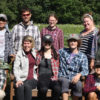Welcome to the *cino Talks blog! I’m Stephanie, one of several residents of the *cino community who live and work in Three Rivers, Michigan.
It feels quite remarkable to remember that just over a year ago, a group of college friends relocated from Grand Rapids to this rural small town in southwest Michigan and into the generously shared space of Trinity Episcopal Church’s rectory. Although many friends from this initial gathering have since embarked upon other endeavors, ongoing conversations have encouraged other college students and postgraduates to spend some time here in Three Rivers as well. I often recall the particular conversation that kindled this decision to join friends here in Three Rivers; a memory that includes the question, “What if a group of friends decided to move to Three Rivers this summer?”
It was springtime, and a pleasant enough day to perch piles of books on a courtyard table to peruse the themes of hospitality, imaginative living, and a faithful commitment to place. Yes, it was none other than Rob and Kirstin, leafing through pages and planning their first spring break trip — a foray into “art, agriculture, and development in rural communities.” Now, when you bump into such delightful friends and catch sight of the well-worn texts written by Cornel West, Wendell Berry, Brian Walsh, Kathleen Norris and the like, all collected together into an epitome of all that your college courses could explore, you get a little curious. And maybe a bit excited.
Rob and Kirstin went on to describe the spring break trip as both ethnographic and participatory, where students would traverse the rural small-town landscape of Three Rivers and visit local organic farms, learn from community members including artists, activists, historians, writers, and business owners, prepare shared meals with locally-sourced food, do service work at *cino’s Huss School building, and live and learn at the Hermitage, a serene Mennonite retreat center located in the hills west of town. This trip would encourage students to envision a community that is informed by a Christian “rule of life,” but also one that is learning-based, service-oriented, imaginative, and committed to the local culture and identity of Three Rivers and the other places we call home. As a student who was preparing to finish college with various opportunities pulling me in several directions, I was quite intrigued by this alternative vision for community. It was this very conversation, and many to come, that seemed to incite a small and ongoing migration of friends to Three Rivers.
Now why am I focusing so fixedly on such a memory? This memory reflection has recently served to unearth a period of questioning, the most pressing of which is the question of why I still believe in the work and identity of *culture is not optional. When I consider all that this past year has encompassed, I can undoubtedly say that it has indeed been a period of practicing hospitality, of striving to commit to this place, and of allowing our imaginations to shape the work that we do together. Sure, I cannot altogether affirm that our presence here has been characterized by an unceasing creative momentum and a clearly defined vision, nor did I ever expect for it to be so. But those initial conversations about how we are to live whole lives in this community still persist, allowing space to ask questions and work through the wobbles and gaps in my own understanding of *cino’s presence in Three Rivers and beyond.
As Kirstin introduced in the opening blog post for the *cino Talks, *culture is not optional, as an organization and gathering of friends, is transitioning into a period when we give greater attention to the mission and vision of this organization. If you’re reading this blog, you’ve most likely participated in some small or large part in *culture is not optional, whether it be living and working in Three Rivers, reading and writing for <a href=”http://www.catapultmagazine.com”><em>catapult magazine</em></a>, visiting <a href=”https://www.cultureisnotoptional.com/space”>Huss School</a>, or all the many other ways you’ve chosen to support this community. The *cino Talks is a dialogue where we hope to include your thoughts and observations regarding *culture is not optional’s organizational identity.
So, in a roundabout way, we’re asking if you can join us in reflecting on two questions for this initial phase:
- Why is *culture is not optional important to you?
- What limits your support of *culture is not optional?
These questions are broad, but your thoughtful and honest reflection is very valuable for *cino as we seek to move forward into a clearer identity and vision in the upcoming months. Answers can be <a href=”http://www.catapultmagazine.com/contact”>submitted here </a> or via the comment section below.
So, again welcome to the *cino Talks blog. We hope that it can become a space where you can also reflect on the ways that *culture is not optional has become important to you and participate in the ongoing conversations about faith, community, culture, place and so much more.
Last modified: March 4, 2020


